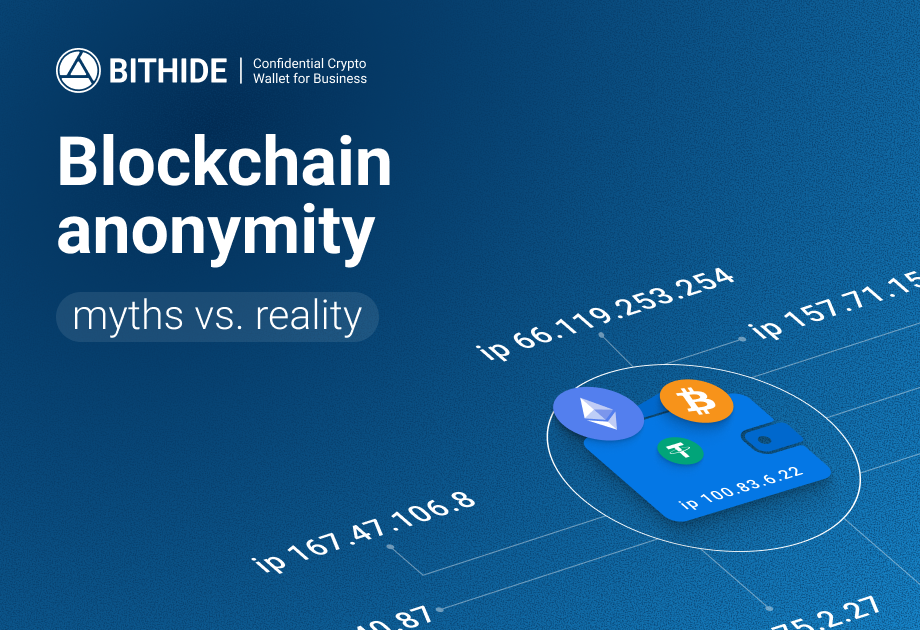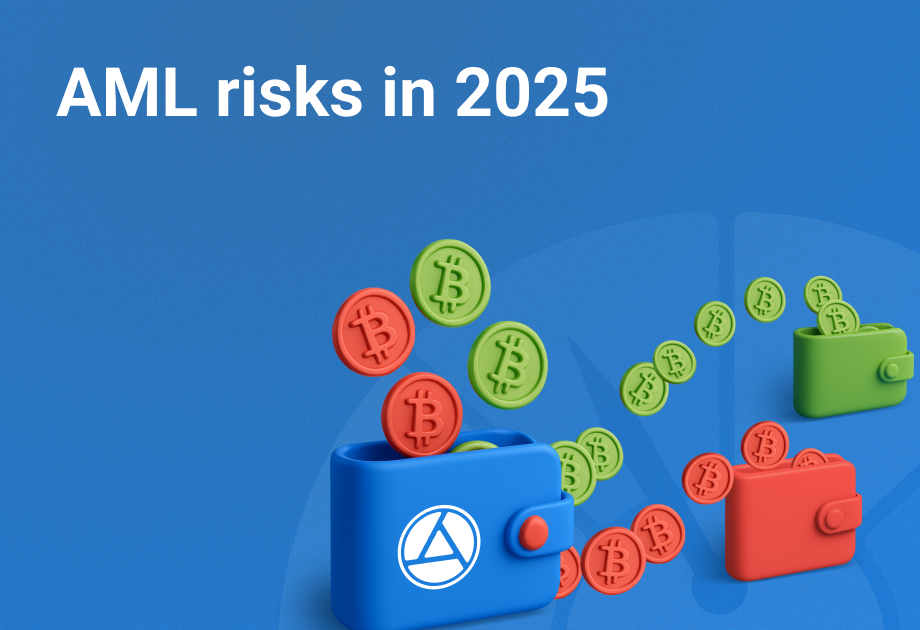Blockchain Is Watching You: Debunking Myths About Crypto Anonymity
Debunking popular misconceptions about blockchain and crypto anonymity.

Cryptocurrencies are often associated with anonymity: according to research, more than 50% of respondents believe Bitcoin is either “highly anonymous” or “somewhat anonymous”.
In this article, we’ll debunk the most common misconceptions about blockchain privacy, such as: Monero is completely anonymous, nodes don’t store sensitive transaction or device data, and using Tor or VPNs is enough to hide your IP address.
Myths About Blockchain and Cryptocurrency Anonymity
Due to widespread myths around “anonymous” blockchain technology, many users neglect privacy and leave behind traces that bad actors can exploit. Here are the seven most common misconceptions about crypto transaction privacy:
Myth 1: Blockchain Is Anonymous
Absolutely not. All transactions are public and permanently recorded in an open ledger. Addresses can be linked to real individuals through behavioral analysis, IP tracking, and exchange data. Advanced on-chain analytics tools like Chainalysis or Elliptic are capable of mapping relationships between transactions and users.
Myth 2: Nodes Don’t Store Important Transaction Information
Not only is that information transmitted to the node — it’s also stored there. Worse, nodes can be operated by hackers or scammers. Now imagine your transaction passing through such a node. It can contain your real IP address and metadata such as timestamps, transaction details, digital signatures, and more.
With this data, attackers can often determine the physical location of the device running your wallet software, and frequently the owner as well.That’s how they may find the person offline and use life-threatening methods to steal access to his wallet.
There has already been a wave of crypto user kidnappings: Ledger co-founder lost a finger, and one crypto holder from Italy was tortured for weeks.
Myth 3: A VPN or Tor Is Enough to Hide Your IP Address
VPN user data is frequently sold on the dark web or leaks online: 360 million SuperVPN records were exposed in 2023. Beyond that, VPNs offer limited privacy:
- The provider sees your real IP and can log it.
- VPNs don’t mask blockchain transaction metadata, it’s still available for analysis.
- If the VPN is compromised, your traffic can be traced.
Tor is better at hiding IP addresses but has its own drawbacks: public nodes often block Tor traffic, making it impossible to receive confirmations. Monitoring services may also flag such transactions as high-risk.
To protect yourself and your assets, it’s crucial to use solutions that actively safeguard your privacy. BitHide’s anonymous wallet uses Tor and VPN together, rotating the IP address three times and establishing a reliable connection with the node. After that, your real IP simply can’t be discovered.
Myth 4: Monero Is a Fully Anonymous Cryptocurrency
Monero is widely considered private, but that’s not entirely accurate. There have already been cases where authorities successfully identified criminals laundering money through Monero. In Japan, 18 individuals were arrested for laundering over $660,000 via XMR. In 2024, the Finnish National Bureau of Investigation also reported tracking XMR linked to hacker Julius Kivimäki.
Researchers and security experts have found ways to trace the origin of XMR funds. Also, Chainalysis revealed a method for deanonymizing Monero by deploying numerous malicious nodes to capture transaction IP addresses and timestamps.
You can be deanonymized in Monero:
- By your IP address, especially if your connection is unstable or your wallet is suspicious.
- If you bought or exchanged XMR on a KYC-compliant exchange.
- If you reused the same IP address or didn’t break transaction chains.
- If your device or wallet was compromised.
Thus, despite its high level of privacy, Monero can still be traced, and there are already proven methods to do so.
Myth 5: If I Don’t Pass KYC, I Can’t Be Found
It’s easy to assume that skipping wallet verification makes you untraceable. That’s a mistake. Even without KYC, any user leaves behind a long trail of:
- Transactions on DEX
- IP addresses
- Cookies
- Browser fingerprints
Analytics services can track a transaction and link it to others. Add behavioral analysis and the blockchain’s permanent memory, and it’s clear that even without KYC, users “reveal” a lot about themselves.
Myth 6: A Mixer Completely Obscures the Trail
Mixers are part of the blockchain. All their actions are recorded and analyzed. Even after “mixing,” behavioral patterns, mistakes (like reusing an IP), transfer amounts, or time of day can reveal the user.
Recently, experts at AML service Global Ledger discovered that the Russian exchange Garantex, though officially shut down, was still laundering funds through Tornado Cash. They sent 99 ETH ($261,000) to the mixer via an intermediary address. The funds were then split into three parts and moved to another buffer address — a textbook obfuscation scheme. But all of this was traceable, as the analysts demonstrated.
Moreover, many mixers are under regulatory scrutiny or already banned — Tornado Cash, for example, is illegal in the US and several other countries. We previously reported on a company whose funds were frozen due to a single mixer-related transaction.
Myth 7: Spreading Assets Across Addresses Is Safer
“I’ll put my eggs in different baskets,” thinks the user, spreading crypto across multiple addresses within a single wallet. But this doesn’t improve anonymity. Addresses from the same wallet often correlate because they share:
- The same signature type
- The same seed phrase
- The same IP address
- Similar activity patterns
This enables scammers to cluster them together. To prevent that, it’s essential to use wallets with anti-clustering technology. In BitHide:
- You can create subwallets that are completely unlinked from each other.
- Gas fees on BNB, Tron, and Ethereum chains are paid from separate addresses with user-defined lifespans, making it hard to group transactions by fee source.
- Temporary addresses are used for automatic fund aggregation, making wallet tracking virtually impossible.
Conclusion
False beliefs about crypto and blockchain anonymity can cost users money, or even parts of their bodies. To protect your funds and yourself, remember:
- Blockchain is not anonymous. All transactions are public and permanently stored.
- Nodes store a lot of information, including IP addresses and metadata.
- Using just Tor or just a VPN isn’t enough to protect your real IP address.
- Monero can be traced. Even without KYC, users leave behind extensive data trails.
- Cryptocurrency that passed through mixers can still be traced.
- Splitting funds across addresses does not make blockchain activity private.
To maintain privacy in crypto payments, choose solutions built for traceability and hack protection — like BitHide, the confidential crypto wallet for business.
Contact our team to learn how BitHide can help your company work with crypto securely and privately.


